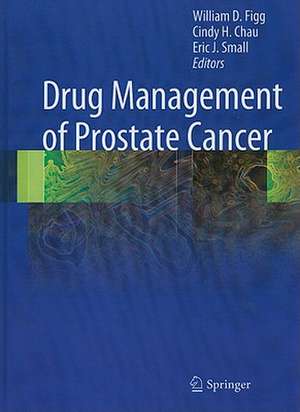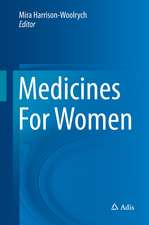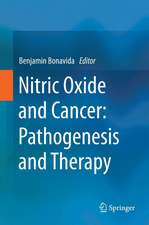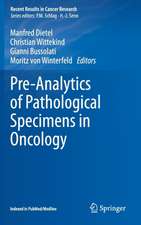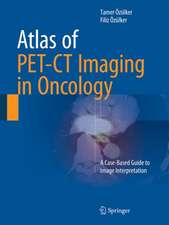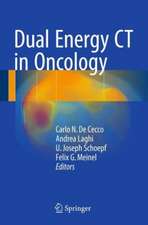Drug Management of Prostate Cancer
Editat de William D. Figg, Cindy H. Chau, Eric J. Smallen Limba Engleză Hardback – 16 sep 2010
Preț: 1310.77 lei
Preț vechi: 1379.75 lei
-5% Nou
Puncte Express: 1966
Preț estimativ în valută:
250.81€ • 273.30$ • 211.35£
250.81€ • 273.30$ • 211.35£
Carte tipărită la comandă
Livrare economică 19-25 aprilie
Preluare comenzi: 021 569.72.76
Specificații
ISBN-13: 9781603278317
ISBN-10: 1603278311
Pagini: 698
Ilustrații: XVIII, 430 p. 34 illus., 22 illus. in color.
Dimensiuni: 190 x 260 x 25 mm
Greutate: 1.07 kg
Ediția:2010
Editura: Springer
Colecția Springer
Locul publicării:New York, NY, United States
ISBN-10: 1603278311
Pagini: 698
Ilustrații: XVIII, 430 p. 34 illus., 22 illus. in color.
Dimensiuni: 190 x 260 x 25 mm
Greutate: 1.07 kg
Ediția:2010
Editura: Springer
Colecția Springer
Locul publicării:New York, NY, United States
Public țintă
Professional/practitionerDescriere
Prostate cancer is the most common noncutaneous prostate cancer. Research has revealed several distinct malignancy and the second leading cause of cancer mechanisms of castration-resistant disease that may deaths among men in the United States. It is a critical converge in patients with disease progression on public health problem and remains incurable in the ADT. Many approaches are currently being evaluated metastatic setting with mortality that usually occurs as to improve the treatment of this condition and these a result of castration-resistant disease. fndings have identifed several potential targets for Since Huggins and Hodges’ report of the dra- therapeutic intervention. These include drugs that are matic clinical effects of suppressing serum testos- more active or less toxic chemotherapy agents; drugs terone levels in men with advanced prostate cancer that induce androgen deprivation; drugs that target in 1941, hormone therapy (also called androgen the androgen receptor and/or androgen synthesis; deprivation therapy [ADT]) has become widely drugs that target specifc pathways, including ang- accepted as the mainstay of therapy for the treat- genesis and tyrosine kinase inhibitors, endothelin ment of advanced prostate cancer. ADT combined antagonists and matrix metalloproteinase inhibitors; with radiation therapy is a standard of care in the and immunologic approaches. Many of these agents treatment of men with locally advanced prostate seem promising and the rationale and effcacy of cancer on the basis of evidence that shows improved these emerging therapies remain to be validated in survival. The role of ADT in the management of future clinical trials.
Cuprins
Section OneHormone TherapyChapter 1Cell Biology of Prostate Cancer and Molecular TargetsMartin E. Gleave, Michael E. Cox, Yuzhuo Wang Chapter 2Luteinizing Hormone-Releasing Hormone (Lh-Rh) and its Agnostic, Antagonistic and Targeted Cytotoxic Analogs in Prostate CancerAndrew V. Schally and Norman L. BlockChapter 3Nuclear Receptor Coregulators: Promising Therapeutic Targets for the Treatment of Prostate CancerHannelore V. Heemers and Donald J. TindallChapter 4Androgens and Prostate Cancer Douglas K. Price and Ann W. HsingChapter 5Androgen Receptor Biology in Prostate CancerEdward P. GelmannChapter 6Androgen Receptor AntagonistsHoward C. Shen, Mary-Ellen Taplin, Steven P. BalkChapter 75 alpha Reductase Inhibitors in Prostate CancerZoran CuligChapter 8Adrenolytic Therapies in Castration Resistant Prostate CancerTerence W. Friedlander and Charles J. RyanChapter 9Androgen Deprivation TherapyNima SharifiChapter 10Pharmacogenetics of the Androgen Metabolic Pathway Francine Zanchetta Coehlo Marques and Juergen Reichardt Section Two ChemotherapyChapter 11MitoxantronePatricia Halterman, Nicholas J. Vogelzang, Alireza Farabishahadel, Oscar B. Goodman, Jr.Chapter 12DocetaxelCourtney K. Phillips and Daniel P. PetrylakChapter 13Beyond Docetaxel: Emerging Agents in the Treatment of Advanced Prostate CancerJonathan RosenbergChapter 14Platinum Agents in Prostate CancerAshley Brick, Junyang Niu, Jiaoti Huang, William K. OhChapter 15Clinical Pharmacology and Pharmacogenetics of Chemotherapy in Prostate CancerTristan M. Sissung and William D. FiggChapter 16Microtubule Targeting AgentsAntonio Tito Fojo and David E. Adelberg Section ThreeAngiogenesisChapter 17Principles of Antiangiogenic TherapyCindy H. Chau and William D. FiggChapter 18Bevacizumab in Advanced Prostate CancerAymen A. Elfiky and William Kevin Kelly Chapter 19Thalidomide and AnalogsErin R. Gardner, Giuseppe Di Lorenzo, and William D. FiggChapter 20Investigational Angiogenesis InhibitorsJeanny B. Aragon-Ching, William Dahut, MDChapter 21Pharmacogenetics of AngiogenesisGuido Bocci, Giuseppe Pasqualetti, Antonello Di Paolo, Francesco Crea, Mario Del Tacca, Romano DanesiSection FourBone MetastasisChapter 22Pathophysiology of Prostate Cancer Bone MetastasisEvan T. Keller and Christopher L. HallChapter 23RadiopharmaceuticalsOliver Sartor and Damerla R. VenugopalChapter 24Bisphosphonates for Prevention and Treatment of Bone MetastasesPhilip J. Saylor and Matthew R. SmithChapter 25Endothelin Receptors as Therapeutic Targets in Castrate Resistant Prostate CancerJoel B. NelsonChapter 26Calcitriol and Vitamin D AnalogsAna R. Jensen, Russell Z. Szmulewitz, Tomasz M. Beer, Edwin M. PosadasChapter 27Cancer Immunology, Immunotherapeutics and Vaccine Approaches Ravi A. Madan, James L. Gulley, Jackie Celestin, Philip M. Arlen, Jeffrey SchlomChapter 28Sipuleucel-T (APC8015): Active Cellular Immunotherapy for Advanced Metastatic Castrate-Resistant Prostate CancerCelestia S. Higano and Mark W. FrohlichChapter 29GM-CSF Genes Transduced Prostate Cancer Vaccines: GVAXLalit R. Patel and Jonathan W. SimonsChapter 30CTLA-4 Blockade for Prostate Cancer TreatmentAndrea L. Harzstark and Lawrence FongSection Five – PreventionChapter 31Prostate Cancer Chemoprevention Strategies Howard L. Parnes, Margaret G. House, Joseph A. TangreaChapter 32Diet and Prostate Cancer Incidence, Recurrence, and Progression RiskJune M. Chan and Erin L. Richman Chapter 33Inflammation as a Target in Prostate CancerMarshall Scott Lucia, James R. Lambert, Elizabeth A. Platz, Angelo M. De MarzoSection SixDrug DevelopmentChapter 34Challenges for the Development of New Agents in Prostate CancerAjjai S. Alva, Deborah A. Bradley, Maha HussainChapter 35FDA Approval of Prostate Cancer
Recenzii
From the reviews:
“For medical oncologists, trainees, researchers, and those in the pharmaceutical industry, Figg … offer a comprehensive and concise summary of the pharmacological treatments for prostate cancer, both current standard and investigative options. The 36 chapters … focus on a multidisciplinary care approach and cover hormone therapy, chemotherapy, angiogenesis, therapy for bones metastases, immunotherapy, chemoprevention, and drug development. Cell biology and molecular targets are also discussed.” (SciTech Book News, December, 2010)
“The 36 chapters in this book … read as independent discussions of many of the most recent discoveries in the area of drug management of prostate cancer. … suitable for medical students, physicians in training, physicians (especially medical oncologists), scientists, translational researchers, and members of the pharmaceutical industry. … An important aspect of this book is that the data represents updated, state-of-the-art information, making it valuable for daily reference. … an excellent resource for readers interested in the management of advanced prostate cancer … .” (Jianqing Lin, Doody’s Review Service, December, 2010)
“This treatise is an exhaustive description of the application of drug management of prostate cancer involving both standard care and investigational agents. … this book will give the reader a detailed insight about the current knowledge from clinical trials into the drug treatment of prostate tumours. The urologists, medical oncologist and others involved in the treatment of the prostate cancer will find in this work a complete review of where we are now.” (M. Horňák, Neoplasma, March, 2011)
“This textbook by W.D. Figg and co-authors … makes an exhaustive overview of present and future medical therapies of prostate cancer. … This book provides the reader with comprehensive information about pharmacological treatments of prostate cancer. All chapters are concise and most of them are well-illustrated. We recommend this textbook to urologists, oncologists who are involved in prostate cancer management, and to all physicians and students who want to update their knowledge in prostate cancer management.” (European Urology Today, April/May, 2011)
“For medical oncologists, trainees, researchers, and those in the pharmaceutical industry, Figg … offer a comprehensive and concise summary of the pharmacological treatments for prostate cancer, both current standard and investigative options. The 36 chapters … focus on a multidisciplinary care approach and cover hormone therapy, chemotherapy, angiogenesis, therapy for bones metastases, immunotherapy, chemoprevention, and drug development. Cell biology and molecular targets are also discussed.” (SciTech Book News, December, 2010)
“The 36 chapters in this book … read as independent discussions of many of the most recent discoveries in the area of drug management of prostate cancer. … suitable for medical students, physicians in training, physicians (especially medical oncologists), scientists, translational researchers, and members of the pharmaceutical industry. … An important aspect of this book is that the data represents updated, state-of-the-art information, making it valuable for daily reference. … an excellent resource for readers interested in the management of advanced prostate cancer … .” (Jianqing Lin, Doody’s Review Service, December, 2010)
“This treatise is an exhaustive description of the application of drug management of prostate cancer involving both standard care and investigational agents. … this book will give the reader a detailed insight about the current knowledge from clinical trials into the drug treatment of prostate tumours. The urologists, medical oncologist and others involved in the treatment of the prostate cancer will find in this work a complete review of where we are now.” (M. Horňák, Neoplasma, March, 2011)
“This textbook by W.D. Figg and co-authors … makes an exhaustive overview of present and future medical therapies of prostate cancer. … This book provides the reader with comprehensive information about pharmacological treatments of prostate cancer. All chapters are concise and most of them are well-illustrated. We recommend this textbook to urologists, oncologists who are involved in prostate cancer management, and to all physicians and students who want to update their knowledge in prostate cancer management.” (European Urology Today, April/May, 2011)
Textul de pe ultima copertă
This book is a comprehensive, concise summary of the pharmacological treatments of prostate cancer. It is an authoritative and up-to-date reference on therapeutic options involving both standard of care and investigational agents. The chapters describe state of the art information on Hormone Therapy, Chemotherapy, Angiogenesis, Therapy for Bone Metastases, Immunotherapy, Prevention, and Drug Development. Drug Management of Prostate Cancer is an excellent resource for medical oncologists, trainees, researchers, and members of the pharmaceutical industry
Caracteristici
Provides a comprehensive guide to the spectrum of emerging pharmacologic agents
Covers both standard of care and investigational therapeutics
Written by recognized international authorities in the field
Well suited for clinicians actively involved in the medical management of patients with prostate cancer
Covers both standard of care and investigational therapeutics
Written by recognized international authorities in the field
Well suited for clinicians actively involved in the medical management of patients with prostate cancer
